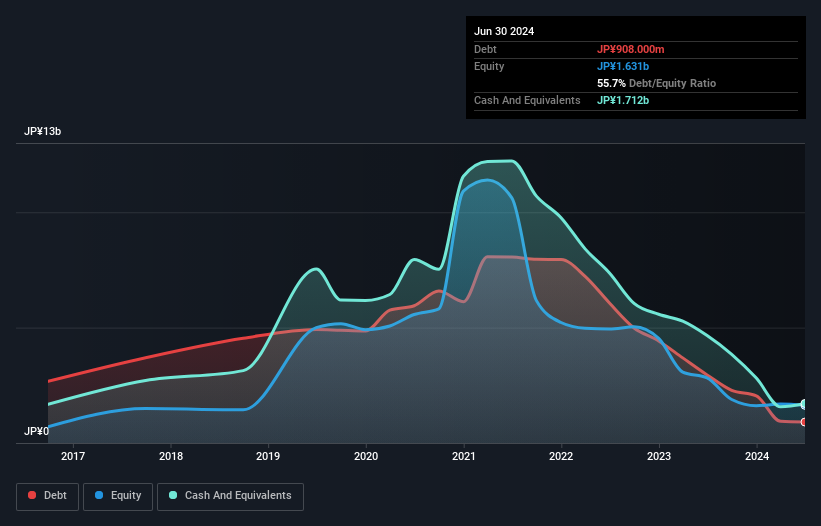Some say volatility, rather than debt, is the best way to think about risk as an investor, but Warren Buffett famously said that 'Volatility is far from synonymous with risk.' So it seems the smart money knows that debt - which is usually involved in bankruptcies - is a very important factor, when you assess how risky a company is. As with many other companies EduLab, Inc. (TSE:4427) makes use of debt. But is this debt a concern to shareholders?
Why Does Debt Bring Risk?
Generally speaking, debt only becomes a real problem when a company can't easily pay it off, either by raising capital or with its own cash flow. In the worst case scenario, a company can go bankrupt if it cannot pay its creditors. While that is not too common, we often do see indebted companies permanently diluting shareholders because lenders force them to raise capital at a distressed price. By replacing dilution, though, debt can be an extremely good tool for businesses that need capital to invest in growth at high rates of return. The first thing to do when considering how much debt a business uses is to look at its cash and debt together.
View our latest analysis for EduLab
What Is EduLab's Net Debt?
As you can see below, EduLab had JP¥908.0m of debt at June 2024, down from JP¥2.95b a year prior. However, its balance sheet shows it holds JP¥1.71b in cash, so it actually has JP¥804.0m net cash.

How Healthy Is EduLab's Balance Sheet?
The latest balance sheet data shows that EduLab had liabilities of JP¥2.07b due within a year, and liabilities of JP¥312.0m falling due after that. Offsetting these obligations, it had cash of JP¥1.71b as well as receivables valued at JP¥627.0m due within 12 months. So these liquid assets roughly match the total liabilities.
This state of affairs indicates that EduLab's balance sheet looks quite solid, as its total liabilities are just about equal to its liquid assets. So it's very unlikely that the JP¥2.81b company is short on cash, but still worth keeping an eye on the balance sheet. Despite its noteworthy liabilities, EduLab boasts net cash, so it's fair to say it does not have a heavy debt load! The balance sheet is clearly the area to focus on when you are analysing debt. But you can't view debt in total isolation; since EduLab will need earnings to service that debt. So if you're keen to discover more about its earnings, it might be worth checking out this graph of its long term earnings trend.
Over 12 months, EduLab made a loss at the EBIT level, and saw its revenue drop to JP¥7.2b, which is a fall of 4.4%. We would much prefer see growth.
So How Risky Is EduLab?
Statistically speaking companies that lose money are riskier than those that make money. And we do note that EduLab had an earnings before interest and tax (EBIT) loss, over the last year. Indeed, in that time it burnt through JP¥838m of cash and made a loss of JP¥926m. But at least it has JP¥804.0m on the balance sheet to spend on growth, near-term. Summing up, we're a little skeptical of this one, as it seems fairly risky in the absence of free cashflow. When analysing debt levels, the balance sheet is the obvious place to start. But ultimately, every company can contain risks that exist outside of the balance sheet. For example EduLab has 3 warning signs (and 2 which are significant) we think you should know about.
When all is said and done, sometimes its easier to focus on companies that don't even need debt. Readers can access a list of growth stocks with zero net debt 100% free, right now.
Valuation is complex, but we're here to simplify it.
Discover if EduLab might be undervalued or overvalued with our detailed analysis, featuring fair value estimates, potential risks, dividends, insider trades, and its financial condition.
Access Free AnalysisHave feedback on this article? Concerned about the content? Get in touch with us directly. Alternatively, email editorial-team (at) simplywallst.com.
This article by Simply Wall St is general in nature. We provide commentary based on historical data and analyst forecasts only using an unbiased methodology and our articles are not intended to be financial advice. It does not constitute a recommendation to buy or sell any stock, and does not take account of your objectives, or your financial situation. We aim to bring you long-term focused analysis driven by fundamental data. Note that our analysis may not factor in the latest price-sensitive company announcements or qualitative material. Simply Wall St has no position in any stocks mentioned.
About TSE:4427
EduLab
Researches and develops academic ability measurement technologies and educational tools in Japan and internationally.
Excellent balance sheet with low risk.
Market Insights
Community Narratives



